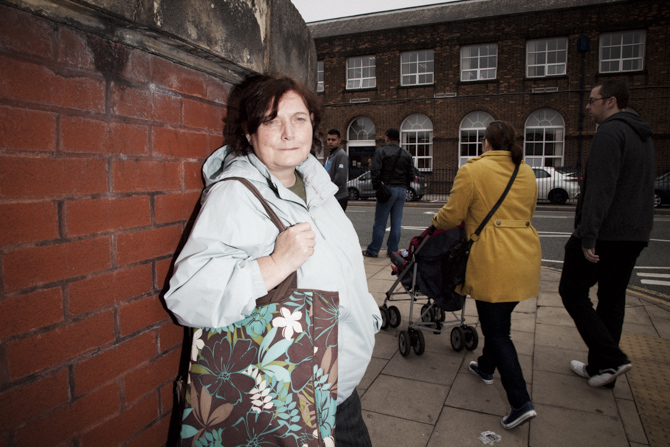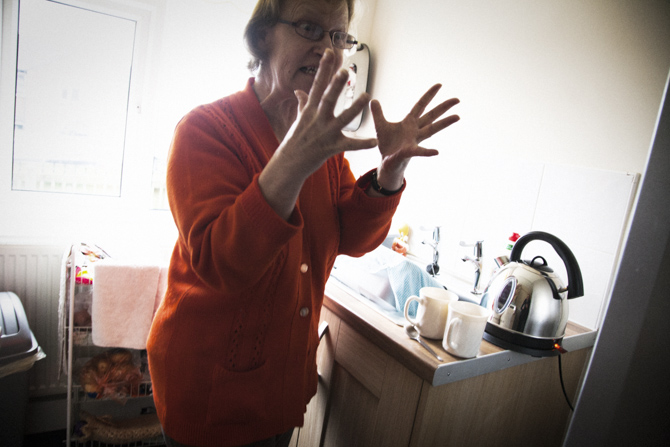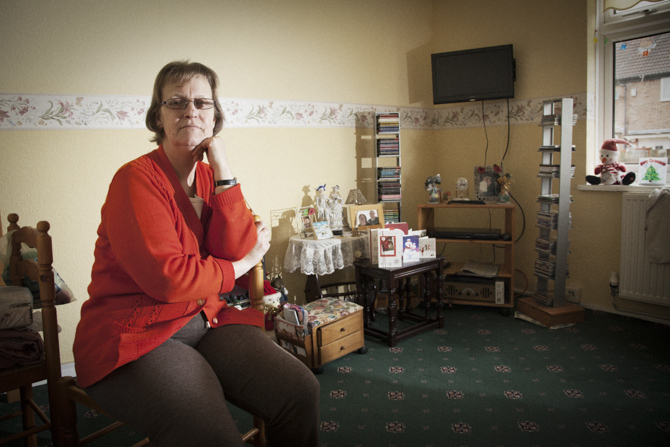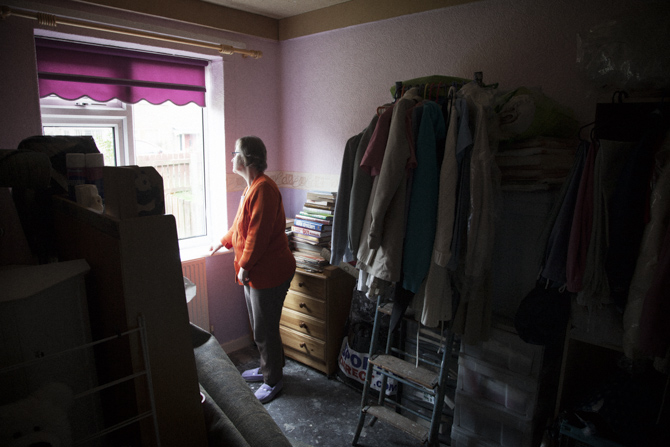It’s two weeks later and I am walking with Morag through the town centre to one of Bolton’s two Jobcentres. A report on the radio this morning suggested there are nearly as many new store openings on UK high streets as there are closures. Bookmakers, charity shops and pawnbrokers top the list of new openings.
“When did you last have a job?” I ask as we negotiate a busy crossing.
“Because of my health I haven’t worked for 27 years,” says Morag, “except for a few weeks as a classroom assistant. I’ve been on Incapacity Benefit. But now I’ve been put on Jobseeker’s Allowance. I came yesterday to sign on and this morning I’m seeing my advisor. I have to show I’ve been looking for work.”
“What happens if you can’t show you’ve been looking?”
“They can sanction you. They can take some of your money from you.”
We reach a nondescript two-storey building opposite a bingo and casino complex. It must only recently have become a Jobcentre because the only signs yet up are those declaring the building is protected by G4S.
“Cath said I have to go in with a positive attitude. I’m supposed to smile… to say it’s been nice weather. The woman will look at me as if I’m mad.”
Morag says she’ll be ten minutes but it’s nearer half and hour before she is out on the pavement again.

“So what did you say to her?”
“I said, Good Morning!” she says in a high-pitched, cheery voice. “But she just said, Yeah.”
“And what did you talk about?”
“She went through my CV but wasn’t very happy. She said there was no point saying I wanted to be a classroom assistant on a CV that I was sending in for a retail job. I have to do more specific ones for particular types of jobs.”
“That makes sense. Do you know how to do that?”
“There’s someone at the UCAN job club who will help me. He’s really good with CVs.
“And then there’s a thing called Universal…” Morag thinks for a second, “… Universal Jobmatch. You have to register online and they give you a number. And you have to keep logging in with that number and going through all the jobs. That way they can see if you are actually looking for work.
“She said for next week I definitely have to be on it, otherwise she could dock money off me. She might say I haven’t earned my money one week and that will be it. You have to toe the line.”
“And how much do you get each week on Jobseeker’s Allowance?”
“£71.70.”
“£71.70? And how much do you have to live off after bills and that?”
“£15 a week before I’ve bought any food. They’ve taken £160 a month off me.”
“We should sit down and have a longer chat,” I suggest.
Morag is easy to talk to. She must have told her horrific story to plenty of professionals over the last 27 years, so re-telling it to me over a hot chocolate in Morrisons is not an ordeal. She admits, though, she hasn’t got ‘closure’ on much of it and gets upset recalling particular details.
Morag tells me about the violence back home in Glasgow, the calls to the police, the terrifying ordeals, one after another. “He had a knife to my throat,” she says, reaching for another tissue. “As soon as I could, I fled but my baby was still inside, with him. It was four days before the police could get in and I got my daughter back.”
Her husband ended up in prison but not, ironically, for the violence he heaped on her. There’s more to this story than is necessary to tell.
“For six months, I wouldn’t leave the house. I tried but I couldn’t move. One day I walked to the local shop but it felt like the walls were moving in on me.”
“My cousin was in Bolton and suggested I moved down here, for a fresh start, so I did. My daughter still hadn’t started school and I couldn’t afford childcare so I went to college. There was no way I was sitting around doing nothing.”
But despite her best efforts Morag couldn’t get back on her feet. She was hospitalised after her stomach muscles fused together. “He never touched my face,” she recalls, “instead he’d kick me in the stomach. Always the stomach. I had to have emergency surgery.”
She was diagnosed with post traumatic stress disorder and spent more than a decade on medication.
“I thought everything was okay, but I was just plodding along, getting my daughter to school. But she was really the one looking after me. Every morning she’d ask me if I’d taken my tablets.”
“How old was she at this point?” I ask.
“Five,” says Morag.
“So, let me get this right. That violent relationship has affected you, both mentally and physically, for the past 27 years?”
She nods. “And last year I got a call to say that my money was stopping and I had to apply for another benefit.”
Morag is one of tens of thousands of disability benefit claimants who have been assessed under the government’s work capability assessment programme in a drive to get people into work and reduce welfare payments.
She was questioned by Atos Healthcare, the private company commissioned by the Department of Work and Pensions, and was subsequently declared fit for work. She appealed against their decision and attended a tribunal.
“It was terrifying,” she says. “There was a Justice of the Peace and a medical examiner and they fired questions at me for an hour. At the end of it they said they were going to fail my appeal. And that was it. I was on Jobseeker’s Allowance and had £160 less each month.”
“Do you feel you are fit for work?”
“I do and I don’t. I want to work. I’m sick of relying on benefits.”
“And now you’re on Jobseeker’s Allowance and living off £15 a week after you’ve paid your bills?”
“But I’ve got absolutely brilliant friends. They give me bits of food and clothes. They gave me this,” she says, tugging at her coat. “But I don’t know how anyone would cope if they didn’t have the friends I had. How would they manage?”
“And how helpful has the UCAN Centre been?”
“I just love them. They’ve really helped to build up my confidence. I’m not there yet but I’m nearly there… we’re nearly there. The course I did with Cath was brilliant. I didn’t know myself. It’s opened my eyes.”
It turns out that, as well as the employment support, Morag is about to tap into the counseling service that comes to the UCAN every week.

Before we’ve even sat down Lyn has started to tell me her story and can barely contain her rage.
Over the last couple of years she’s been hit by a double whammy of government policy changes that has seen her lose her house and, at age 60, forced her to continue looking for a job she thinks she’ll never, ever get.
Lyn and her husband Tom moved to Bolton nine years ago, at first near the town centre. “We had troublesome neighbours,” she recalls, “but were told we had to stick it out for a year before they would move us. Then we moved to Breightmet, near the UCAN.”
“And what was that house like?”
“We had three bedrooms, a front and back garden. Tom was a joiner and he fitted wardrobes in our bedroom; he revamped the kitchen, made it look much bigger than it actually was. He did lots on that house.
“In fact, Tom was my king and I was his queen and that, to me, was our palace. And this place,” she waves an arm, “this place will never be like that.”
Before Bolton the couple lived in France where Tom had a job inspecting campsites for a travel company. It was a good life. After nearly four years he was made redundant and within months of their return to the UK was diagnosed with cancer.
“Tom died three years ago. We’d met in 1998 and married in 2000 so we had just 13 years together. Before he died we had quite a good income. There was his pension and, because of his illness, he was on DLA [Disability Living Allowance].
“Now I’m on JSA [Jobseeker’s Allowance], £71 a week. It’s gone from this,” she extends her arms, “to this,” pinching a finger and thumb together. “And you think to yourself, how do you manage? But you do, you have to.”
“How much would you have had to pay in ‘bedroom tax’, if you’d stayed in that house?”
“I think it was £19 a week,” she says. “Out of £71.”

The under-occupancy penalty is a key element of the Government’s welfare reforms and is intended to reign in housing benefit payments. Why should the state pay for claimants to live in a bigger property than they need? Originally introduced into the private housing sector the penalty rolled out to include social housing from April 2013.
By way of balance I start to put the Government’s case for the ‘tax’ to Lyn, “Before you say any more,” she says, “I couldn’t give two hoots what the Government thinks because they are not living in the real world and don’t understand how we live. At the end of the day, it doesn’t matter who is in power and I’ll put it to you crudely,” – she does – “they’re all the same. They will never know what it’s like for us. Even if they left power tomorrow, they are so wealthy and affluent, they could just buy any house they wanted. We can’t.”
… continued in “This will never be my palace”
continued from… A double whammy
Faced with reduced housing benefit, tenants have a choice. Either they opt to adjust their budgets to take into account of the reduction or they move.
Neither option is straightforward. It’s highly unlikely that tenants have any slack in their limited budgets and so many decide to cut back on food or heating so they can stay in their homes. And moving isn’t always possible. Few housing providers have the optimum spread of property types to suit the demographics of all their customers.
I’ve heard Bolton at Home has a glut of perfectly good two-bedroomed flats in their tower blocks. Single people are unwilling to take them on because they’d incur the charge and, quite rightly, families aren’t keen because there’s nowhere for their kids to play.
This controversial charge has hit Lyn hard. It’s not applicable to pensioners and Lyn might have been able to stay in her ‘palace’ had it not been for the recent changes made to retirement ages. A progressive increase in the State Pension Age means that she can only ‘retire’ and start to draw State Pension when she is 63.

“What was your first reaction when you heard about the bedroom tax?” I ask.
Lyn purses her lips, deciding what to say next. “I was disgusted. I felt angry. I still feel angry. If I had been able to retire when I was 60 then I wouldn’t have had to move. But how could I afford to pay for two bedrooms for another three years?
“I saw this place was available back in February and the housing people told me it’d be ready in six weeks. So I started to pack. Within six weeks I was ready. But it was the end of October before I was able to move.”
“You mean it took seven months rather than six weeks?”
Since she moved five weeks ago Lyn and her friends have decorated the living room and, to save money, she’s brought her carpets from her old house and had them fitted here.
“It’s a lot warmer than the house,” she concedes.
“And is that it’s only saving grace?” I ask. “What do you miss about the old place?”
“Not being there!” she says indignantly. “We had a lot of laughs in that house. Up to the end my husband was always laughing and joking. That’s him there.” She points to a framed picture on a small table.
“And how did you feel on the day you left?” I ask. Lyn purses her lips again. It’s a unnecessary question. I already know the answer.
“Very upset. Very upset.”
Because she is claiming Jobseeker’s Allowance, Lyn has to show each week that she is searching for work or she risks sanctions. She’s been to sessions at the UCAN to learn basic IT so she can browse the Universal JobMatch website.
“Shop work, cashier, care assistant, anything really,” she says when I ask what she’s been searching for. “And I’ve had some interviews but you can tell from the way they look at you that they think you’re too old. Of course they can’t tell you that, but that’s what they’re thinking.”
“Do you think you’ll get a job between now and when you retire?”
“No, I’ve got no chance. I’d like to work but I’m not kidding myself. I think it’s degrading having to look for work at my age. I shouldn’t be doing it.”
No one has moved into Lyn’s old house and she takes the long way round when you goes to the UCAN so she doesn’t have to walk past it. “It still hurts,” she says.
I ask if I can take a picture in the bedroom, maybe of her sitting on the bed.
“That’s my bed,” she says, pointing to the settee I’m on. “The bedroom is packed with my old stuff. I haven’t got room to put the bed up yet, so I’m sleeping in here for now.”
I photograph Lyn in the bedroom anyway.
“I’ll keep it nice,” says Lyn. “But this will never be my palace.”
I’m nipping in between consultations. Except these are a bit more than consultations. This morning Mike has already had hour-long sessions with two of his new customers and after me, and presumably a bite of a sandwich, he is seeing two more.
He tells me these particular clients – because of depression, ill health, drugs or alcohol misuse – had been ‘parked‘ on Incapacity Benefit for some time, drawing benefit but not expected to find work.
Since the welfare reforms these men, and they are mainly men, find themselves having to get to grips with the flawed Universal Jobmatch online employment site and the increasingly rigorous demands of the Job Centre.
I like that the UCAN can be super-responsive. As a new need arises it adapts what if offers or adds something new into the mix. Which is why Vanessa has commissioned Mike, the CV-writing guru and career coach from Tuesday’s job club, to work closely with a number of hand-picked, long-term unemployed residents.
“There’s a part of Breightmet that is ranked pretty highly among the indices of most deprived areas in the UK,” says Mike. “Bolton at Home has researched the figures and there’s a particularly high incidence of people who are on, or had been on, Incapacity Benefit.”

“So what sort of people are we talking about? Can you describe them?”
“One of the guys has been without regular work for more than 20 years, others for over 10,” says Mike.
“The younger ones obviously less so but with all of them substance misuse is a common theme. Interestingly, There is also an almost universal lack of confidence around literacy, particularly spelling. They can read well enough but writing is an issue.”
“But isn’t the JobCentre helping this group?” I ask. “As you say, they have been economically inactive for so long, surely they can’t be expected to job search without any support?”
“If I was in the JobCentre’s shoes, I’d argue they are being offered a lot,” says Mike. “But it’s inevitably very prescriptive given the volumes of candidates they are dealing with. One guy has been put on the Work Programme for new claimants and another has been sent along to Bury College to have his basic skills assessed… but now he has to wait two or three months before there’s a literacy course available. So there is support, but it tends to be less tailored. Does that make any sense?
“Yes. Yes, it does. But what are you doing differently?”
“I’ve come in with an open mind. We want to make sure their interaction with the JobCentre and with Universal Jobmatch is as positive as it can be. But what is fascinating and unexpected is how much the guys are opening up to me about themselves and about what’s stopping their progress. And there have been things I can do to help.”
“Like?”
“For instance, one guy at the end of our first session told me he was really self-conscious of his teeth. He hadn’t had dental treatment for 10 years and had very bad teeth, so bad they were affecting his self-confidence.
“So I organised a local NHS dentist to see him, even paid for a taxi to get him to one of the appointments and next week he’s being fitted with a new set of false teeth. He’s delighted, he can’t wait.”
“That’s brilliant. I like that.”
“Another guy is nervous of speaking on the phone and so doesn’t have a mobile. Of course, if you’re searching for work, coming across well in a phone call can be important. So I got him a cheap mobile from Asda and some credit and suggested he used it to order takeaway food, for instance. I call him from time to time and he’s even spoken on the phone to Vanessa now. It’s a little step which has improved his ability to function.”
“It comes down to seeing people as individuals, doesn’t it?” I say
“These are little gestures but quick wins, small victories that are showing them we can make progress. What’s fascinating is how freshly motivated a couple of them are at least, to get a job. I’m not going to put myself out here as the ‘fairy jobfather’ but I do think, in the right circumstances, two of them could be employed in the near future by someone and do well.”
“And the others?”
“Motivationally, they’re not quite ready yet.”

This is week four in a six-week project. After his ‘quick wins’ Mike has started working on what he calls ‘reframing’ the life story. “To begin with they’d all talk very negatively about themselves: drug and alcohol problems, being out of work, being homeless maybe. But now we are moving towards a more positive life story.
“We’re beginning to find the positive elements about them and getting them to express them more openly: are they a family man? Do they like working with other people? Maybe they enjoy the outdoors… anything really to get them thinking differently, and expressing their life stories more positively.
“The aim is to them more attractive to employers. None of it is untruthful, just a skewing of their story in their favour really.”
What Mike is doing over six hours isn’t rocket science. He’s building self-esteem, giving people time, allowing them to discover what they’ve got to offer. It’s personal and it’s making an impact.
As a little pilot study there are some important lessons to be learnt… and not just by the UCAN.
“I enjoy the little differences I am seeing already,” he says as I get ready to take his portrait. “And I hope they are too. It’s very satisfying.”






